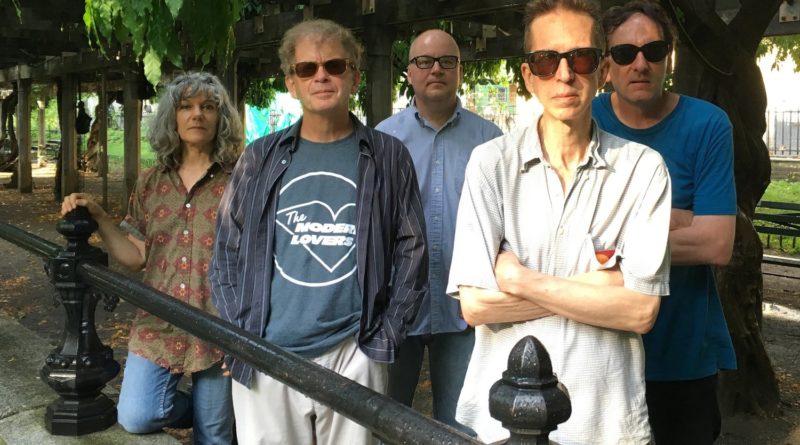What Goes On In His Mind
Glenn Mercer of The Feelies on Lou Reed and The Velvet Underground

This past July marked a celebratory milestone in the still-growing canon of legendary jangle ‘n’ strum guitar-rock juggernaut The Feelies: it’s been ten years since these heroes of Haledon, New Jersey reunited to the joy of its American underground rock-worshiping nerds everywhere.
Back in 2008, a then-active Sonic Youth were set to inflict their trademark skronk-bathed art-rock histrionics over Battery Park in downtown New York City on July 4th when Thurston Moore had this epiphany: Lure the long-dormant Feelies out of retirement to open the show. The Feelies—a crucial force in the independent underground whose influence and cred runs far and wide as its 1980’s brethren in R.E.M., the Replacements and Hüsker Dü—were known as fixtures at Hoboken’s legendary club Maxwell’s, particularly on just about every July 4th, hence Moore’s prodding the jangle-rock trailblazers back onto the stage.
A decade into their second life, guitarist/singer Glenn Mercer, guitarist Bill Million, bassist Brenda Sauter, percussionist Dave Weckerman and drummer Stan Demeski have outlasted Sonic Youth while trudging on in their typical Feelies snail-like pace. In its first wave, they released four classic indie rock albums in eleven years (the 1980 touchstone Crazy Rhythms, ‘86’s The Good Earth, ‘88’s Only Life and ‘91’s Time for a Witness) and in its post-reunion second act, there’s been a pair of records that stack up neatly to those seminal records (2011’s comeback Here Before and ‘17’s In Between).
It’s no secret to Feelies heads how instrumental bands like The Stooges, The Modern Lovers, the Beatles, the Rolling Stones, Neil Young, Patti Smith and The Velvet Underground were in helping shape the sound of this N.J. institution. Cover versions of said groups have been a staple of the Feelies’ live show for decades and this past weekend, in conjunction with the just-opened art and music exhibition, The Velvet Underground Experience, the Feelies’ played a sold-out all-Velvets covers set at White Eagle Hall in Jersey City.
Rock and Roll Globe spoke to Mercer about his first recollections of hearing the Velvets, their influence on the Feelies, opening for Lou Reed, seeing Reed live in concert and even playing with the late, great VU leader.
I wanted to touch on your earliest memories of The Velvet Underground.
Their music was kind of foreign sounding. I remember that song “Heroin” and I thought it was kind of a novelty song, specifically written to kind of be shocking. It’s easy to play on guitar so there’s probably a little bit of a connection with that. But it wasn’t until the third record that really made a connection with me then working my way back from that. I also probably didn’t become a huge fan until Lou Reed was solo, getting into Lou Reed and then going back and rediscovering a lot of The Velvet Underground stuff.
You’ve said “Sweet Jane” was one of the first songs you learned on guitar but it was The Velvet Underground (1969), their third record, that made the biggest impression on you?
I think, in my mind, I had this idea of what they were based on. I find a song or two on each record I really connected with. But just in general, a lot of this stuff just seemed kind of weird, too avant-garde and arty initially when it came out. I got into rock music with the Beatles and a lot of British Invasion stuff. The Velvet Underground definitely incorporated elements of jazz and they were arty. By that third record they were becoming more song-oriented, more melodic. It was a lot easier to frame a reference from groups I had been into previously.
So your introduction to that world was solo Lou Reed before you were heavy into the Velvets?
I can’t map out my musical inspirations; it just goes in and you don’t think about it, and obviously, I was into a lot of bands. A lot of people think it (the Feelies) kind of started with The Velvet Underground but that wasn’t the case, really.
Yes, whenever people write about or think of the Feelies, the first band that comes to mind is The Velvet Underground it seems.
Bill and I talked a lot about that band, what we like about them and also their songs are really easy to play. They were obscure so we can play some Velvet Underground songs and slip ’em in when we’d do shows and people were like “Oh, is that original?” They wouldn’t know and you wanna play stuff that’s not what people have heard many times before. That’s where we started doing covers.
Were the Modern Lovers a bigger influence than the Velvets were?
I don’t know if you’d say bigger but they were a huge influence on the early Feelies because Bill and I saw them at, I think, their first New York show. We weren’t really familiar with them at all. I think I read an interview with Jonathan that he did in Interview magazine that kind of intrigued me so I wasn’t sure what to expect. I knew a little bit about him but they totally blew our minds. But I know Bill had seen The Velvet Underground live a few times so it probably was a little bit different for him.
Did Bill ever talk about his experience seeing the Velvets live with you? It was during a residency at Max’s Kansas City, right?
Not particularly, other than that they had a lot of energy. I remember my brother and Bill getting into, not an argument but more a discussion, about who had more energy, the MC5 or The Velvet Underground. My brother would be like “Oh, it’s the MC5. They play so much faster and louder” and Bill was like, “Well, energy is not all about speed.”

Did you ever see the Velvets live?
No but I saw Lou Reed for Rock ‘n’ Roll Animal and then when we (the Feelies) toured with him.
How did The Feelies score that slot opening for Reed on his New York tour in 1989?
There was a radio station in Long Island, WLIR, and they had invited us to play at their Christmas party. To entice us to perform, they ran down a list and Joey Ramone was going to be there, Joan Jett and Lou Reed. Bill kind of jokingly said “Well, if Lou will play with us, we’ll do it.” The person coordinating the event really ran with it and said “Oh, sure. We’ll see.” Someone talked to him and he was familiar with us through our version of “What Goes On,” which I guess was right around that time that Only Life record came out. When he agreed, we were like “Oh, this is great.”
Was that trippy that Lou Reed knew about your cover of “What Goes On?”
Yeah, it was, but I think overall it just blew my mind that he didn’t want to sing but we were supposed to play his songs. That was totally uncomfortable and I think he maybe made it through half of a song and just realized that this is stupid. He was standing behind me and I motioned to him to come up and he did and he took over from there. I think he wanted to test the waters a little bit to see how it was gonna sound, if he felt comfortable enough to do it. He did and we did what we normally were doing around that time, which was kind of a medley of three songs, which was “European Son,” “Run Run Run” and “What Goes On.” When we got off stage, he was like “We gotta go back out. We got to play some more.” We figured out what we’re going to do from there. When we came back we did “Sweet Jane” and may have done something else.
Do you remember if Lou was into it?
Totally, yeah. Nobody twists his arm. He wants to do it or he doesn’t, you know? (Laughs)
Lou was famously ornery, at least where interviews were concerned.
We were aware of that side of him but we never really saw it. Occasionally during his sound check if we were around, we’d hear him getting a little impatient sometimes the way the sound check was going because he was really concerned about us being comfortable. I remember one night his sound check was running long and they said “Oh, we’re going to have to cut the Feelies’ sound check and he was like “No, the Feelies don’t check then I don’t play.”
How did it go down that you covered “What Goes On” on Only Life?
I don’t even remember. Just needed a song. It seemed to fit, I guess.
You mentioned earlier that you and Bill would talk about the Velvets a lot. Were your conversations about their guitar sound and how it helped shape the sound of the Feelies?
Well, not a whole lot about the guitars. We actually talked about Moe Tucker a lot, about her drumming. So when we started the Feelies, as far as guitars, we wanted them to have the interaction, not only the Velvet Underground, but the MC5 or the way the Rolling Stones guitars interact. But we specifically were looking for a drummer who didn’t play a lot of fills, didn’t play a lot of cymbals, real stripped-down, primitive and basic.
Getting back to seeing Lou Reed solo: did you see him live in concert other times besides for Rock ‘n’ Roll Animal?
I saw him for Transformer at Alice Tully Hall. That did precede the Rock ‘n’ Roll Animal; it was my first time seeing him.
Do you remember anything about that show?
I remember he was really high. He played a song or two without his guitar being plugged in.
What about the Rock ‘n’ Roll Animal concert you saw?
I didn’t like it, I didn’t like it at all. It seemed the guitars didn’t interact; one would play rhythm, one would play lead and maybe go back and switch but it didn’t really work. It didn’t have that kind of weaving interaction of parts that The Velvet Underground had. (They had) real long guitar solos that didn’t really to go anywhere. Although, I like Steve Hunter a lot and Dick Wagner. I respect them as players but it just was so far removed from the versions of the songs that II liked.
This year is the tenth anniversary of the Feelies reuniting. The last record, In Between, came out a couple of years ago. Any future plans?
We usually don’t make too many plans. We usually play every couple of months and when we start getting tired of songs, we write new ones (laughing). We have some new stuff but we really haven’t had much time to spend on’em. Everything takes so long. Bill is in Florida, Brenda is in Pennsylvania and we really don’t get together too often.





editors are still needed. OW writers submit—and have printed—shit like this:
“—instrumental bands like The Stooges, The Modern Lovers, the Beatles, the Rolling Stones, Neil Young, Patti Smith and The Velvet Underground—” read the article to find what the writer thought these words mean…
He meant instrumental like instrumental in terms of importance, not instrumental in the literal sense. I am the editor, so if you have a problem you can reach out to me directly at editor@rockandrollglobe.com.